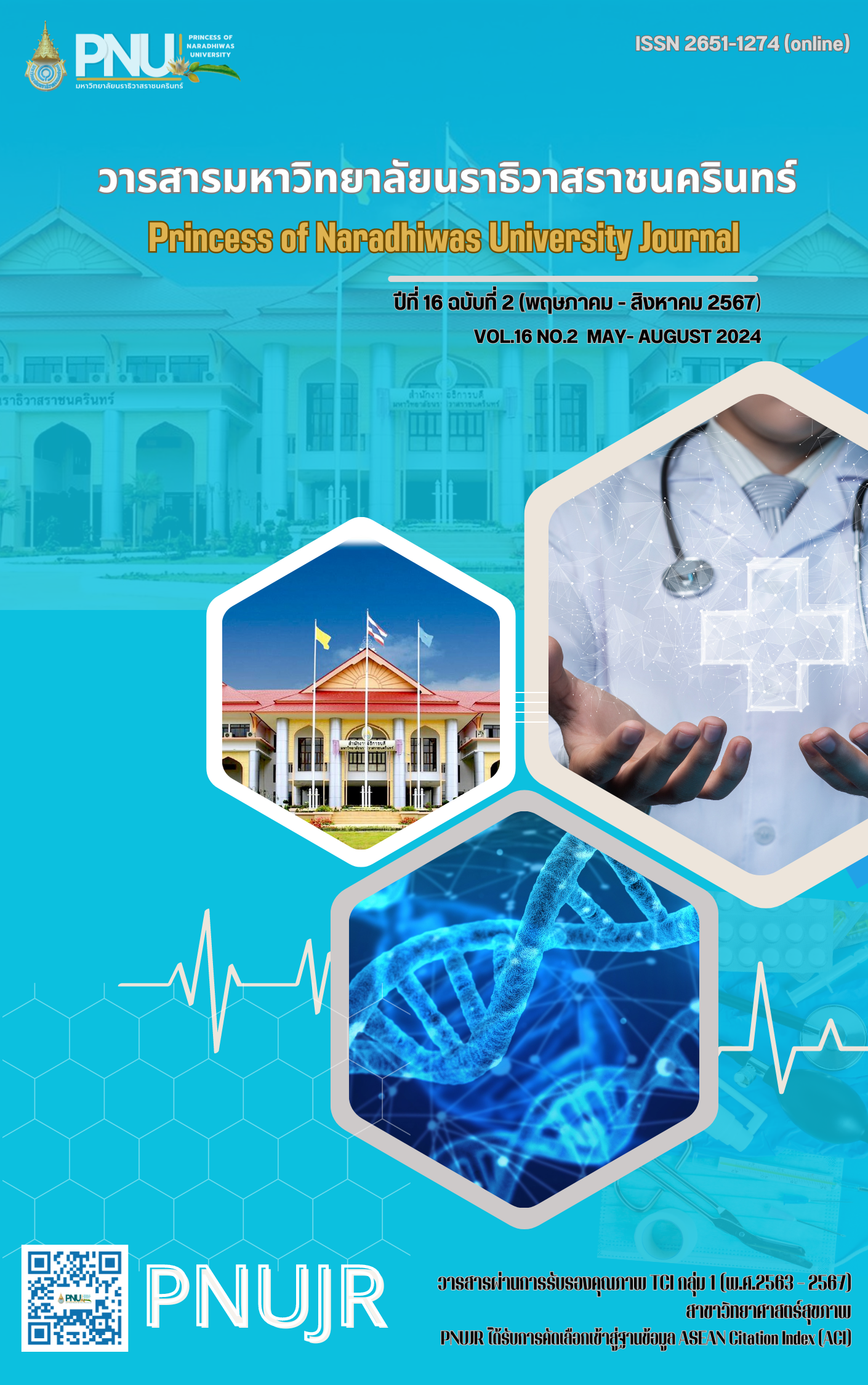ศึกษาความเป็นไปได้และการยอมรับการใช้รูปแบบการเยี่ยมติดตามผู้ป่วยโรคเรื้อรังโดยทีมเครือข่ายผู้ดูแลในชุมชนพิปูน จังหวัดนครศรีธรรมราช: การศึกษาเชิงคุณภาพ
อรัญญา รักหาบ
คำสำคัญ:
ผู้ดูแล, โรคเรื้อรัง, ชุมชน, เครือข่าย, รูปแบบการติดตามบทคัดย่อ
การวิจัยเชิงคุณภาพนี้มีวัตถุประสงค์เพื่อศึกษาความเป็นไปได้และการยอมรับการใช้รูปแบบการเยี่ยมติดตามผู้ป่วยโรคเรื้อรังโดยทีมเครือข่ายผู้ดูแลในชุมชนพิปูน จังหวัดนครศรีธรรมราช ซึ่งรูปแบบดังกล่าวนี้เป็นนวัตกรรมที่พัฒนาจากเครือข่ายผู้ดูแลผู้ป่วยโรคเรื้อรังที่ใช้ชุมชนเป็นศูนย์กลาง ที่มุ่งเน้นการระบุและการจัดการผู้ป่วยที่เป็นโรคเรื้อรังในชุมชนพิปูน เครื่องมือวิจัย คือ แบบสังเกตและการสัมภาษณ์แบบกึ่งโครงสร้าง กลุ่มตัวอย่าง คือ ผู้ป่วยโรคเบาหวานและความดันโลหิตสูง 7 ราย และผู้ดูแล 15 ราย โดยมีเป้าหมายเพื่อประเมินผลของรูปแบบการเยี่ยมติดตามผู้ป่วยโรคเรื้อรังจากทีมเครือข่ายผู้ดูแลในชุมชน วิเคราะห์ข้อมูลโดยใช้เทคนิคการวิเคราะห์เนื้อหา
ผลการศึกษาพบว่า การใช้รูปแบบการเยี่ยมติดตามผู้ป่วยโรคเรื้อรังโดยทีมเครือข่ายผู้ดูแลในชุมชนครั้งนี้มีความสำคัญ ซึ่งบ่งชี้ว่ารูปแบบดังกล่าวนี้มีความเป็นไปได้ที่จะนำไปใช้ได้จริงและมีการยอมรับการใช้รูปแบบการเยี่ยมติดตามผู้ป่วยโรคเรื้อรังโดยทีมเครือข่ายในการจัดการโรคเรื้อรังในชุมชนรูปแบบนี้สามารถนำไปปรับใช้ให้เหมาะกับความต้องการของชุมชน เนื่องจากมีความยืดหยุ่น และความสามารถใช้ในการขยายผลได้ โดยเฉพาะการฝึกอบรมผู้ดูแลและการจัดตั้งระบบเครือข่ายการดูแลโรคเรื้อรังในชุมชน เพื่อให้ผู้ป่วยในชุมชนมีความสะดวกในการเข้าถึงบริการสุขภาพ และได้รับการดูแลที่ดี ซึ่งนำไปสู่การปรับปรุงในการเข้าถึงและการจัดการด้านการดูแลสุขภาพ จุดเด่นที่สำคัญของรูปแบบนี้ คือ การส่งเสริมสนับสนุนให้มีการเยี่ยมติดตามสุขภาพที่บ้าน ทำให้ประหยัดเวลาและลดค่าใช้จ่ายต่อผู้ป่วยและผู้ดูแล รวมทั้งรูปแบบดังกล่าวนี้ยังเป็นที่ยอมรับในทีมผู้ให้บริการด้านการดูแลสุขภาพที่เกี่ยวข้องต่าง ๆ ด้วย ตลอดจนผู้ป่วยโรคเรื้อรังมีอิสระในการตัดสินใจในการรับการดูแลทำให้เสริมศักยภาพของผู้ป่วย
นอกจากนี้ รูปแบบการเยี่ยมติดตามนี้ ยังมุ่งเน้นถึงความสำคัญของระบบการตรวจเยี่ยมติดตามผลอย่างละเอียด โดยให้ความสำคัญและความจำเป็นในการดูแลอย่างต่อเนื่อง ซึ่งความครอบคลุมนี้มีความสำคัญอย่างยิ่งต่อการดูแลผู้ป่วยเป็นรายบุคคล โดยเฉพาะอย่างยิ่งสำหรับผู้ที่มีอาการเรื้อรังในสภาพแวดล้อมของชุมชน
รูปแบบดังกล่าวนี้ อาจจะนำไปเป็นต้นแบบเพื่อไปปรับประยุกต์ใช้ในชุมชนอื่น ๆ ที่มีบริบทใกล้เคียงกัน ซึ่งอาจจะมีการบูรณาการตามสภาพของแต่ละชุมชนโดยชุมชนตามความเหมาะสม ในการจัดการกับโรคเรื้อรังในพื้นที่ เพื่อให้เกิดประสิทธิภาพในการปรับปรุงการจัดการโรคเรื้อรัง โดยดึงการมีส่วนร่วมในท้องถิ่นและความร่วมมือแบบสหสาขาวิชาชีพในการยกระดับการให้บริการด้านการดูแลสุขภาพในชุมชน
เอกสารอ้างอิง
AlQuaiz, A. M., Kazi, A., Almigbal, T. H., AlHazmi, A. M., Qureshi, R., & AlHabeeb, K. M. (2021). Factors Associated with an Unhealthy Lifestyle among Adults in Riyadh City, Saudi Arabia. Healthcare (Basel), 9(2), 221. https://doi.org/10.3390/healthcare9020221
Centers for Disease Control and Prevention (2019, August 7). Caregiving for Family and Friends: A Public Health Issue. https://www.cdc.gov/aging/caregiving/caregiver-brief.html
Clark, A., & Himmelberger, L. K. (2023). Patient autonomy: Cancer. The Journal of the American Dental Association, 154(1), 94 - 95. https://doi.org/10.1016/j.adaj.2022.08.011
Creswell, J. W., & Creswell, J. D. (2018). Research design: qualitative, quantitative, and mixed methods approach. (5th ed.). Thousand Oaks, California, SAGE.
Fernando, G., & Hughes, S. (2019). Team approaches in palliative care: a review of the literature. International Journal of Palliative Nursing, 25(9), 444 - 451. https://doi.org/10.12968/ijpn. 2019.25.9.444
Gamage, A.U., & Seneviratne, R.D. (2021). Physical inactivity, and its association with hypertension among employees in the district of Colombo. BMC Public Health 21, 2186. https://doi.org/10.1186/s12889-021-12013-y
Haldane, V., Chuah, F. L, Srivastava, A., Singh, S. R., Koh, G. C., Seng, C. K., & Legido-Quigley, H. (2019). Community participation in health services development, implementation, and evaluation: A systematic review of empowerment, health, community, and process outcomes. PLoS One, 14(5), e0216112. https://doi.org/10.1371/journal.pone.0216112
Health Data Center. (2023). NCDs Reports of Phipun district, Nakhon Si Thammarat province, Thailand. https://nrt.hdc.moph.go.th/hdc/reports
Karam, M., Chouinard, M-C., Poitras, M-E., Couturier, Y., Vedel, I., Grgurevic, N., & Hudon, C. (2021). Nursing care coordination for patients with Complex needs in primary healthcare: a scoping review. International Journal of Integrated Care, 21(1), 16. https://doi.org/10.5334/ijic.5518
Kim, M. S., Lee, S. J., Park, M. S., Jeong, E. H., & Chang, S. O. (2020). Toward a conceptual framework for the interdisciplinary function-focused care in nursing homes. Japan Journal of Nursing Science, 17(3), e12330. https://doi.org/10.1111/jjns.12330
Liu, Y., Zhang, H., & Xu, R. (2023). The impact of technology on promoting physical activities and mental health: a gender-based study. BMC Psychol 11, 298. https://doi.org/10.1186/s40359-023-01348-3
Michielsen, L., Bischoff, E. W. M. A., Schermer, T., & Laurant, M. (2023). Primary healthcare competencies needed in the management of person-centred integrated care for chronic illness and multimorbidity: Results of a scoping review. BMC Primary Care, 24(1), 98. https://doi.org/10.1186/s12875-023-02050-4
Park, J. H., Moon, J. H., Kim, H. J., Kong, M. H., & Oh, Y. H. (2020). Sedentary Lifestyle: Overview of Updated Evidence of Potential Health Risks. Korean journal of family medicine, 41(6), 365 – 373. https://doi.org/10.4082/kjfm.20.0165
Pype, P., Mertens, F., Helewaut, F., & Krystallidou, D. (2018). Healthcare teams as complex adaptive systems: understanding team behaviour through team members' perception of interpersonal interaction. BMC Health Serv Res, 18(1), 570. https://doi.org/10.1186/s12913-018-3392-3
Rajamani, S.K., & Iyer, R.S. (2023). Networks in Healthcare: A Systematic Review. Bio Med Informatics, 3(2), 391 - 404. https://doi.org/10.3390/biomedinformatics3020026
Ruiz-Ramos, J., Hernández, M. H., Juanes-Borrego, A. M., Milà, R., Mangues-Bafalluy, M. A., & Mestres, C. (2021). The Impact of Pharmaceutical Care in Multidisciplinary Teams on Health Outcomes: Systematic Review and Meta-Analysis. Journal of the American Medical Directors Association, 22(12), 2518 - 2526. https://doi.org/10.1016/j.jamda.2021.05.038
Saddi, F.C., Harris, M.J., Coelho, G.A., Pêgo, R.A., Parreira, F., Pereira, W., Santos, A.K.C., Almeida, H.R., & Costa, D.S. (2018). Perceptions and evaluations of front-line health workers regarding the Brazilian National Program for Improving Access and Quality to Primary Care (PMAQ): a mixed-method approach. Cadernos de saude publica, 34(10), e00202417. doi.org/10.1590/0102-311X00202417
Schenker, M., & Costa, D. H. D. (2019). Advances and challenges of health care of the elderly population with chronic diseases in Primary Health Care. Cien Saude Colet, 24(4), 1369 - 1380. doi.org/10.1590/1413-81232018244.01222019
Surendran, S., Foo, C.D., Matchar, D. B., Ansah, J. P., Car, J., Choon, G., & Koh, H. (2022). Developing integration among stakeholders in the primary care networks of Singapore: a qualitative study. BMC Health Services Research, 22(1), 782. https://doi.org/10.1186/s12913-022-08165-1
Vollset, S.E., Goren, E., Yuan, C.W., Cao, J., Smith, A.E., Hsiao, T., Bisignano, C., Azhar, G.S., Castro, E., Chalek, J., Dolgert, A.J., Frank, T., Fukutaki, K., Hay, S.I., Lozano, R., Mokdad, A.H., Nandakumar, V., Pierce, M., Pletcher, M., & Murray, C.J.L. (2020). Fertility, mortality, migration, and population scenarios for 195 countries and territories from 2017 to 2100: a forecasting analysis for the Global Burden of Disease Study. The Lancet, 396(10258), 1285 - 1306. https://doi.org/10.1016/S0140-6736(20)30677-2
Wagner, E.H. (1998). Chronic disease management: what will it take to improve care for chronic illness?. Effective Clinical Practice, 1(1), 2 - 4. https://pubmed.ncbi.nlm.nih.gov/10345255/
World Health Organization. (2022, June 17). Mental health. https://www.who.int/news-room/fact-sheets/detail/mental-health-strengthening-our-response
World Health Organization. (2023, September 16). Noncommunicable diseases. https://www.who.int/news-room/fact-sheets/detail/noncommunicable-diseases
ดาวน์โหลด
เผยแพร่แล้ว
รูปแบบการอ้างอิง
ฉบับ
ประเภทบทความ
สัญญาอนุญาต
ลิขสิทธิ์ (c) 2024 วารสารมหาวิทยาลัยนราธิวาสราชนครินทร์

อนุญาตภายใต้เงื่อนไข Creative Commons Attribution-NonCommercial-NoDerivatives 4.0 International License.




